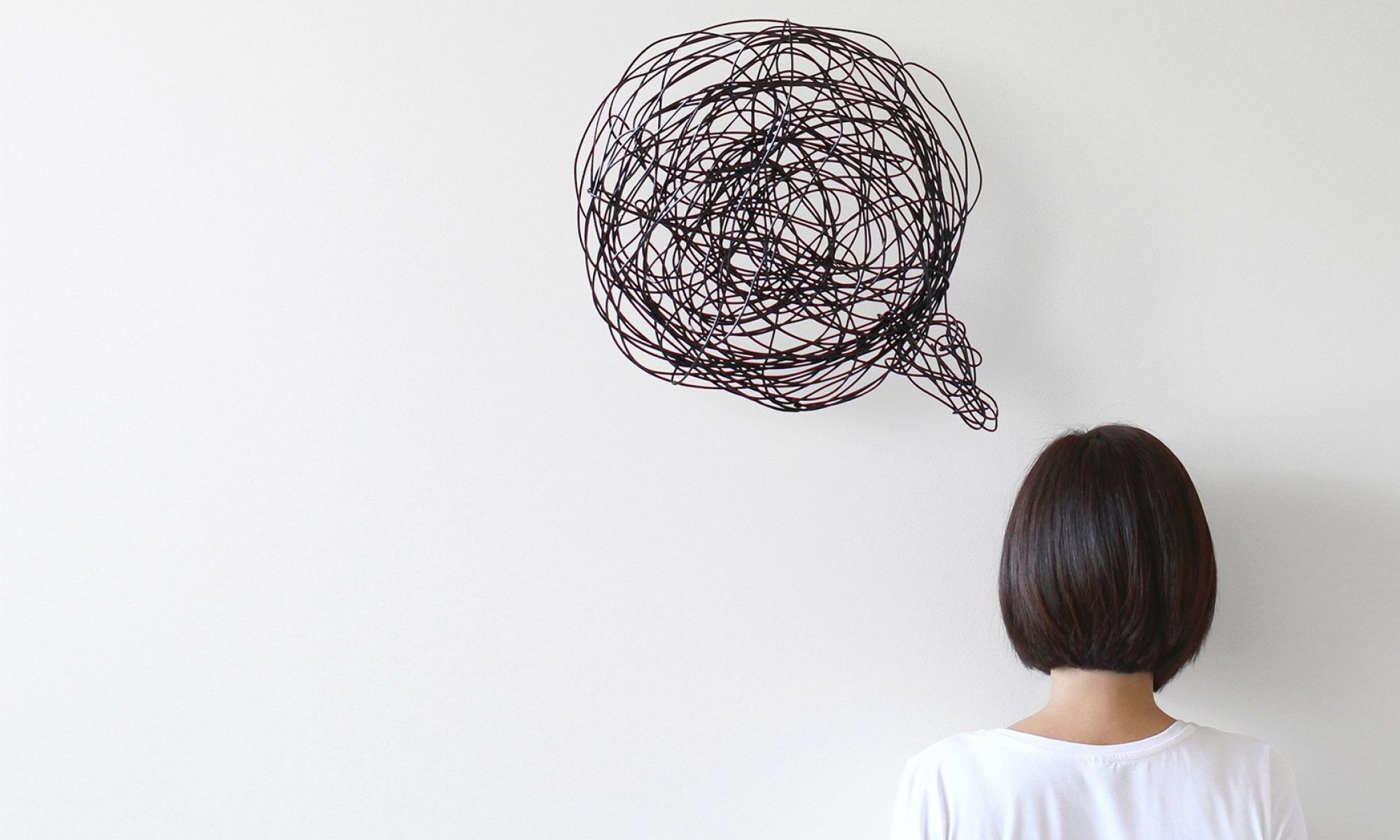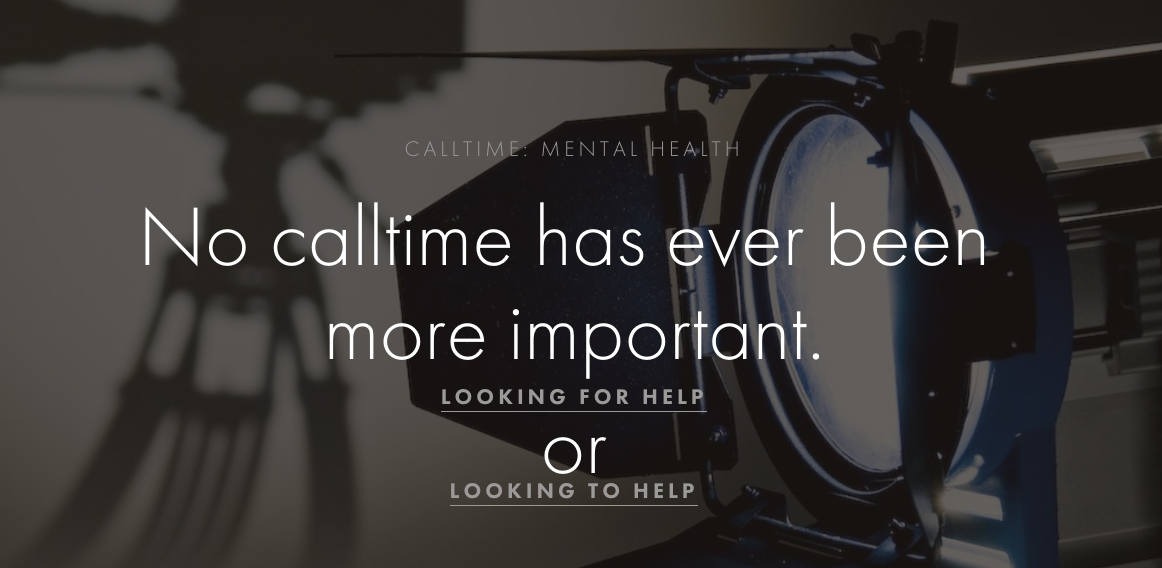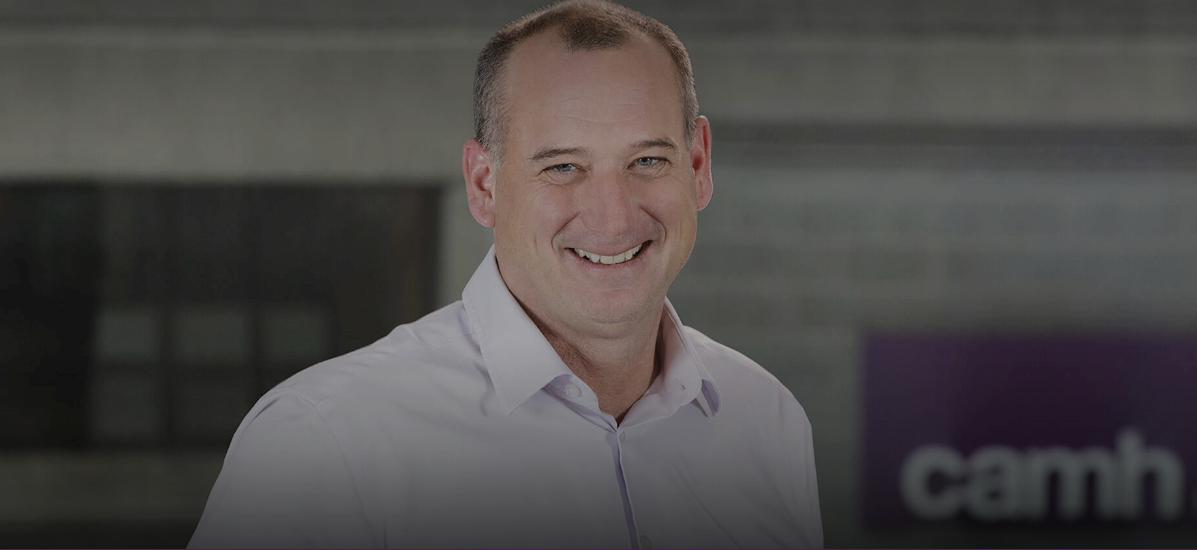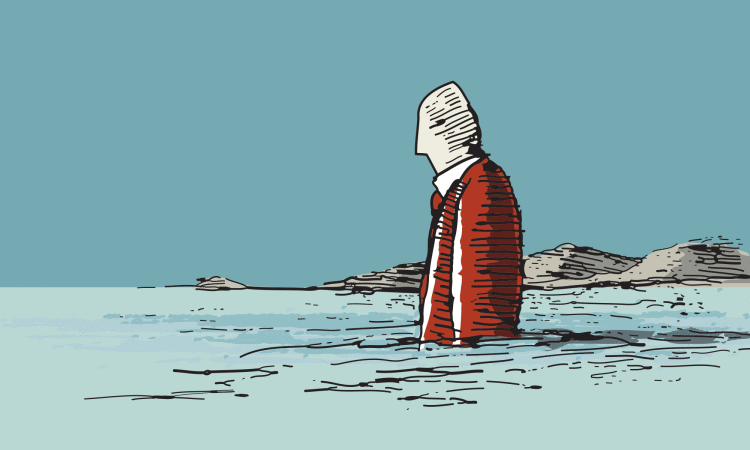https://www.youtube.com/watch?v=SVhz1EdMspk
The Simple Habit That Can Help You Fight Depression
When someone has clinical depression, it’s important they see a doctor or a mental-health professional who can evaluate them properly and provide effective options for treatment. But there’s also something known in the psychology world as subthreshold depression—a condition in which people exhibit some symptoms of depression, but not enough for a clinical diagnosis.
It’s estimated that between 10% and 24% of the population has subthreshold depression (sometimes referred to as mild depression) at some point in their lives. And for those people, a new study suggests, practicing mindfulness meditation may help improve their mood and reduce their risk of developing full-blown depression. The study, published in the Annals of Family Medicine, highlights yet another reason why meditation may be good for both physical and mental health.
The study included 231 Chinese adults with subthreshold depression, meaning they scored between five and nine out of a total of 27 points on a standard depression scale. Half received mindfulness training two hours a week for eight weeks, while the other half received no special treatment but continued to receive their usual medical care.
During the mindfulness training, participants were instructed on setting short- and long-term goals; monitoring their activity and mood; planning out their activities; body scanning; and both sitting and walking meditations. They were also provided a CD of audio recordings for guided meditations and were asked to practice at home at least six days a week.
His College Knew of His Despair. His Parents Didn’t, Until It Was Too Late.
In the days after her son Graham hanged himself in his dormitory room at Hamilton College, Gina Burton went about settling his affairs in a blur of efficiency, her grief tinged with a nagging sense that something did not add up.
She fielded requests and sympathy notes from the college, promising the dean of students a copy of his obituary “so you can see how special Hamilton was to him.” This was why his suicide “makes no sense,” she added in a puzzled aside. The next day, Ms. Burton accepted condolences from the college president, and assured him “how right a choice Hamilton was” for her son.
But two weeks later, she read her son’s journal and everything changed. Mr. Burton, a sophomore, wrote that he was flunking three of his four classes and called himself a “failure with no life prospects.” He had struggled to sleep, missed classes, turned in assignments late. The college had known of his difficulty, he wrote, but had been slow to offer help and understanding.
“Would you care to shed some light on this?” Ms. Burton asked in an angry email sent at 2:53 a.m. to the academic dean, with copies to the president and the dean of students. “If this is what drove Graham, I don’t think I’ll be able to cope.”
A good time to think about stereotypes
There is no reason to believe people who live with mental illness are innately more creative than non-mentally ill people, or more violent.
In recent years, this and other mental health awareness campaigns have put a spotlight on the prejudices and false associations that surround mental illness.
Sometimes, the stereotypes don’t seem all that harmful. An image that often comes to mind is of a musician, a poet or painter holed up in an attic somewhere, creating masterpieces while suffering from feverish delusions. It’s a scene we’ve seen countless times in movies.
We all know the stories; Edgar Allan Poe, Ludwig van Beethoven and Vincent van Gogh are but a few luminaries who appear to have suffered from mental illnesses.
In reality though, there is no proof that people who live with mental illness are innately more creative than non-mentally ill people. Creativity is not some sort of mystical gift that comes coupled with a curse. Creative expression — the writings of Poe, the music of Beethoven, the paintings of van Gogh — is the product of hard work.
David Goldbloom, a Canadian psychiatrist who has investigated the link between mental illness and creativity, has pointed out that mental illness actually hampers creativity. When artists are sick, they either can’t create, or the work they do is of poor quality compared to the work they do when they are well.
Certainly, the myth of the mad artist is at least a positive stereotype and far better than the other stereotype associated with mental illness — that of the dangerous, violent, unpredictable criminal.
Of course there is no truth to this idea, either.
Research has shown that a person’s propensity for violence correlates with socio-economic status, gender and life history, not his or her mental health.
However when a violent crime hits the news, we are quick to blame mental illness, which many of us see as the byproduct of faulty wiring. But mental illness is not an entirely biological phenomenon. It is partially the product of social environments.
One of the problems with stereotypes, positive or negative, is that they lead us into making irrational arguments. Just look at the way in which many people have been talking about U.S. President Donald Trump. It has been suggested that Trump’s “unpredictability” is evidence he is mentally ill and therefore unfit for office. A Google search for “Donald Trump unpredictability mental illness” yields 714,000 results.
Regardless of one’s opinion of Trump’s fitness for office, “unpredictability” is not a symptom of any mental illness, or an accurate description of a person suffering from any mental illness. It’s a completely invented facet of a stereotype.
My name is Wil Wheaton. I Live With Chronic Depression and Generalized Anxiety. I Am Not Ashamed.
Before I begin, I want to warn you that this talk touches on many triggering subjects, including self-harm and suicide. I also want you to know that I’m speaking from my personal experience, and that if you or someone you know may be living with mental illness, please talk to a licensed and qualified medical professional, because I am not a doctor.
Okay, let’s do this.
Hi, I’m Wil Wheaton. I’m 45 years-old, I have a wonderful wife, two adult children who make me proud every day, and a daughter in-law who I love like she’s my own child. I work on the most popular comedy series in the world, I’ve been a New York Times Number One Bestselling Audiobook narrator, I have run out of space in my office for the awards I’ve received for my work, and as a white, heterosexual, cisgender man in America, I live life on the lowest difficulty setting — with the Celebrity cheat enabled.
My life is, by every objective measurement, very very good.
And in spite of all of that, I struggle every day with my self esteem, my self worth, and my value not only as an actor and writer, but as a human being.
That’s because I live with Depression and Anxiety, the tag team champions of the World Wrestling With Mental Illness Federation.
And I’m not ashamed to stand here, in front of six hundred people in this room, and millions more online, and proudly say that I live with mental illness, and that’s okay. I say “with” because even though my mental illness tries its best, it doesn’t control me, it doesn’t define me, and I refuse to be stigmatized by it.
So. My name is Wil Wheaton, and I have Chronic Depression.
It took me over thirty years to be able to say those ten words, and I suffered for most of them as a result. I suffered because though we in America have done a lot to help people who live with mental illness, we have not done nearly enough to make it okay for our fellow travelers on the wonky brain express to reach out and accept that help.
I’m here today to talk with you about working to end the stigma and prejudice that surrounds mental illness in America, and as part of that, I want to share my story with you.
When I was a little kid, probably seven or eight years old, I started having panic attacks. Back then, we didn’t know that’s what they were, and because they usually happened when I was asleep, the adults in my life just thought I had nightmares. Well, I did have nightmares, but they were so much worse than just bad dreams. Night after night, I’d wake up in absolute terror, and night after night, I’d drag my blankets off my bed, to go to sleep on the floor in my sister’s bedroom, because I was so afraid to be alone.
There were occasional stretches of relief, sometimes for months at a time, and during those months, I felt like what I considered to be a normal kid, but the panic attacks always came back, and each time they came back, they seemed worse than before.
Recovery is possible when people seek help
A few short years ago, some people may have said I “had it all.” I was a partner in an investment firm. A family man who spent weekends at the cottage. An avid cyclist and skier.
But I was also secretly struggling, sick with a depression so severe that it eventually grew into psychosis. The mental pain of this depression was unbearable. This is such a dangerous illness that can be life threatening – and I knew where it could lead. I thought my life was over.
And still I tried to keep my illness hidden and hoped no one would notice. I was terrified that if people found I was getting sick that I would lose my job and my family, and everything that went with them. I got sicker and sicker until it was almost too late.
Depressed People Use These Words More Often
From the way you move and sleep, to how you interact with people around you, depression changes just about everything. It is even noticeable in the way you speak and express yourself in writing. Sometimes this “language of depression” can have a powerful effect on others. Just consider the impact of the poetry and song lyrics of Sylvia Plath and Kurt Cobain, who both killed themselves after struggling with depression.
Scientists have long tried to pin down the exact relationship between depression and language, and technology is helping us get closer to a full picture. Our new study, published in Clinical Psychological Science, has now unveiled a class of words that can help accurately predict whether someone has depression.
Traditionally, linguistic analyses in this field have been carried out by researchers reading and taking notes. Nowadays, computerized text analysis methods allow the processing of extremely large data banks in minutes. This can help spot linguistic features which humans may miss, calculating the percentage prevalence of words and classes of words, lexical diversity, average sentence length, grammatical patterns and many other metrics.
Read more here…
5 Ways to Simplify Your Life
By Amy Morin for Psychology Today
Make room for the things that really matter.
I’ve spent the majority of the last two years living on a boat. Life on a sailboat has required me to think about what I actually need to be happy in life.
I discovered that having less stuff, fewer obligations, and more time makes room for the most important things. I have more space in my life for people I love, things I appreciate, and opportunities I want to take.
And while living on a boat has lots of benefits, it definitely isn’t for everyone. But no matter where you live or what you do, you can take steps to simplify your life.
Here’s why simplifying your life is important — everything in your life takes up space. Whether it’s mental space, physical space, or calendar space, you only have so much room.
Everything you own, everything you do, and everyone you spend time with costs you something. And when you have an abundance of stuff, it costs you a lot.
Simplifying your life will give you more time, space, and energy. The more space you have, the freer you’ll be to truly enjoy everything. Here are five ways to simplify every area of your life.
1. Declutter your house.
Your environment affects how you feel physically and psychologically. Whether you waste time looking for misplaced items, or you grow overwhelmed every time you open your closet, having too much stuff wastes your resources.
A clean, organized space helps you feel more productive and energetic than when you’re living among heaps of clothes, stacks of papers, and piles of dishes.
When you have fewer items to worry about, you’ll feel lighter. You’ll also have energy to care for the items that you keep. Start decluttering one room at a time, and see for yourself how much better you feel when you get rid of things you don’t need.
18 Comics That Help Illustrate What Depression Feels Like
1. When you have depression, you can feel like it can totally overwhelm you at any moment:
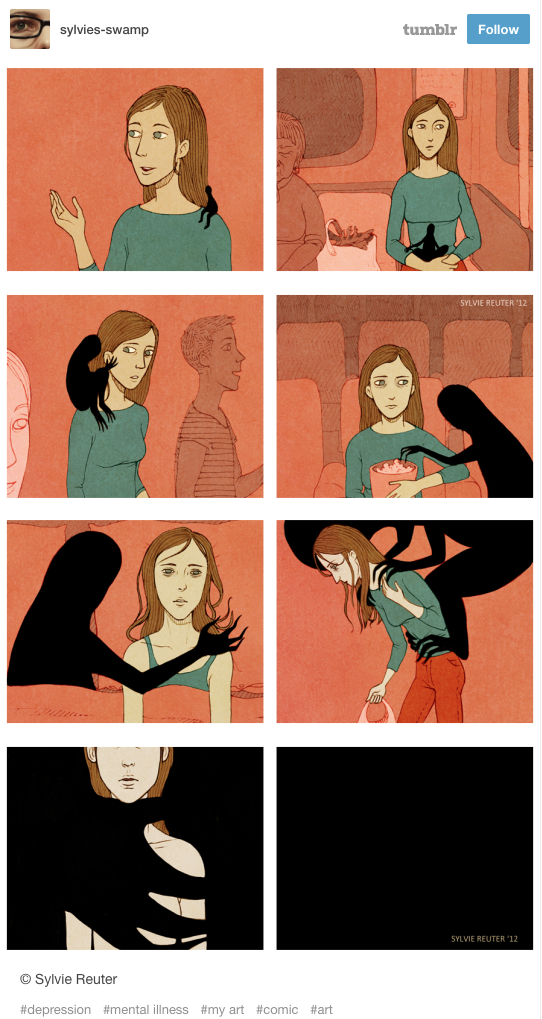
Illustration by Sylvie Reuter.
2. And you might feel like you have to hide it when you’re out in “the real world.”
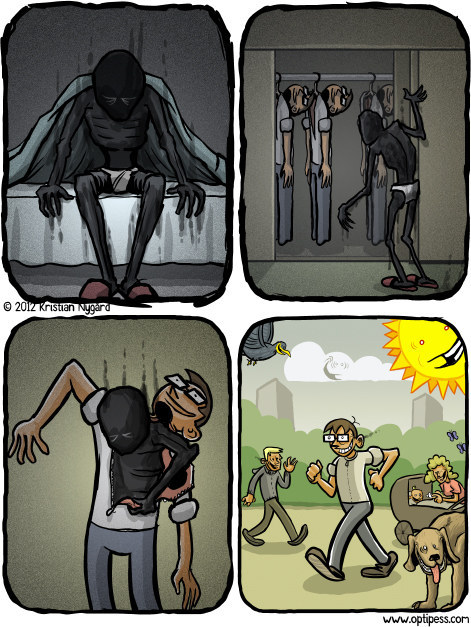
Illustration by Kristian Nygård.
3. And you just want to hide yourself away.
Comic strip by Ruby etc.
Student-led mental health initiatives shifting how schools provide supports
As Canadian universities and colleges face increasing pressure to provide better mental-health services on campus, students are looking to give schools fresh ideas on how to tackle the issue.
That’s how 24-year-old Ryan Golt became involved with working alongside Montreal’s McGill University to support students. But before he got there, he faced his own mental-health crisis.
After his first year of undergraduate studies, Golt says he began to feel lonely, isolated and irritable. The psychology student started to have issues with his interpersonal relationships, and ultimately, he says he couldn’t function.
“Eventually, it just became too much and the negative emotions started to overcome me,” said Golt.
That was in 2014, when he experienced his first bout of depression. It’s a mental illness that impacts about 14 per cent of students at McGill, and close to 20 per cent of students nation wide, according to recent data from the National College Health Assessment, a survey that presents the health data of students so schools know where to target their services.
